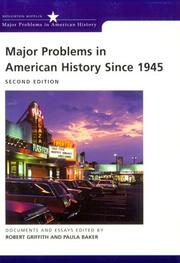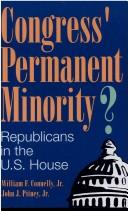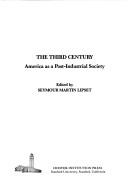| Listing 1 - 10 of 53 | << page >> |
Sort by
|
Book
ISBN: 0262021323 9780262021326 Year: 1978 Volume: 4 Publisher: Cambridge, Mass. MIT Press
Abstract | Keywords | Export | Availability | Bookmark
 Loading...
Loading...Choose an application
- Reference Manager
- EndNote
- RefWorks (Direct export to RefWorks)
United States --- Politics and government --- 1945-1989 --- United States - Politics and government - 1945-1989
Book
ISBN: 007018397X 9780070183971 Year: 1971 Publisher: New York : McGraw-Hill,
Abstract | Keywords | Export | Availability | Bookmark
 Loading...
Loading...Choose an application
- Reference Manager
- EndNote
- RefWorks (Direct export to RefWorks)

ISBN: 0395868505 9780395868508 Year: 2001 Publisher: Boston (Mass.) : Houghton Mifflin,
Abstract | Keywords | Export | Availability | Bookmark
 Loading...
Loading...Choose an application
- Reference Manager
- EndNote
- RefWorks (Direct export to RefWorks)
Book
ISBN: 0471216208 0471216224 9780471216209 Year: 1975 Publisher: New York (N.Y.) Wiley
Abstract | Keywords | Export | Availability | Bookmark
 Loading...
Loading...Choose an application
- Reference Manager
- EndNote
- RefWorks (Direct export to RefWorks)

ISBN: 082263032X Year: 1994 Publisher: Lanham ; London Littlefield
Abstract | Keywords | Export | Availability | Bookmark
 Loading...
Loading...Choose an application
- Reference Manager
- EndNote
- RefWorks (Direct export to RefWorks)

ISBN: 0817970312 9780817970314 Year: 1980 Volume: 203 Publisher: Stanford, Calif. Hoover Institution Press, Stanford University
Abstract | Keywords | Export | Availability | Bookmark
 Loading...
Loading...Choose an application
- Reference Manager
- EndNote
- RefWorks (Direct export to RefWorks)
Book
ISBN: 0913530131 9780913530139 Year: 1979 Publisher: Pacific Palisades (Calif.) : Palisades publishers,
Abstract | Keywords | Export | Availability | Bookmark
 Loading...
Loading...Choose an application
- Reference Manager
- EndNote
- RefWorks (Direct export to RefWorks)
Book
ISBN: 0520909755 0585181683 0520068300 9780520909755 9780585181684 9780520065260 0520065263 9780520068308 0520065263 Year: 1989 Publisher: Berkeley University of California Press
Abstract | Keywords | Export | Availability | Bookmark
 Loading...
Loading...Choose an application
- Reference Manager
- EndNote
- RefWorks (Direct export to RefWorks)
Have the American people grown more politically sophisticated in the past three decades, or do they remain relatively ignorant of the political world? Did a "great leap forward" take place during the 1960s in which our citizenry became involved and adept voters? In this important book, Eric Smith addresses these and other provocative questions that have long befuddled political scientists and policymakers.Much of the current wisdom about American voters derives from an argument advanced in a volume entitled The Changing American Voter, written by Nie, Verba, and Petrocik. In this work, the authors contend that the electorate made a "great leap forward" in political sophistication and ideological thinking between the 1960 and 1964 elections. They argue that people changed in response to a shifting environment, and that, in particular, the surge of protest and ideological rhetoric between 1960 and 1964 engendered a new political savvy and sophistication. In their view, people learned to understand politics better, to relate the issues to the candidates more accurately, and to cast more informed, intelligent votes.In The Unchanging American Voter, Smith takes issue with this portrait of an engaged American citizenry and replaces it with a quite different picture of the voters of this nation. He posits a more bleak political landscape in which the typical voter knows little about politics, is not interested in the political arena and consequently does not participate in it, and is even unable to organize his or her attitudes in a coherent manner. To support this view, Smith demonstrates how the indices by which Nie, Verba, and Petrocik measured levels of sophistication during the 1960s were methodologically flawed and how a closer examination of supposed changes reveals only superficial and unimportant shifts in the ways voters have approached the ballot box since the 1950s.The Unchanging American Voter is an intelligent and original work that provides a new perspective of the American citizenry. It is sure to engender discussion and debate about the dynamics of voting in postwar America.
Book
ISBN: 0253342961 0253202094 9780253202093 Year: 1978 Publisher: Bloomington London Indiana University Press
Abstract | Keywords | Export | Availability | Bookmark
 Loading...
Loading...Choose an application
- Reference Manager
- EndNote
- RefWorks (Direct export to RefWorks)
Book
ISBN: 0815738412 9780815738411 Year: 2021 Publisher: Washington, D.C.: Brookings Institution Press,
Abstract | Keywords | Export | Availability | Bookmark
 Loading...
Loading...Choose an application
- Reference Manager
- EndNote
- RefWorks (Direct export to RefWorks)
"Donald Trump has reinvented the presidency, transforming it from a well-oiled if sometimes cumbersome institution into what has often seemed to be a one-man show. But even Trump's unorthodox presidency requires institutional support, from a constantly rotating White House staff and cabinet who have sought to carry out-and sometimes resist-the president's direct orders and comply with his many tweets. Nonetheless, the Trump White House still exhibits many features of its predecessors over the past eight decades. When Franklin D. Roosevelt was inaugurated, the White House staff numbered fewer than fifty people, and most federal department were lightly staffed as well. As the United States became a world power, the staff of the Executive Office increased twentyfold, and the staffing of federal agencies blossomed comparably. In the fourth edition of Organizing the Presidency, a landmark volume examining the presidency as an institution, Stephen Hess and James P. Pfiffner argue that the successes and failures of presidents from Roosevelt through Trump have resulted in large part from how the president deployed and used White House staffers and other top officials responsible for carrying out Oval Office policy. Drawing on a wealth of analysis and insight, Organizing the Presidency addresses best practices for managing a presidency that is itself a bureaucracy"--
| Listing 1 - 10 of 53 | << page >> |
Sort by
|

 Search
Search Feedback
Feedback About UniCat
About UniCat  Help
Help News
News